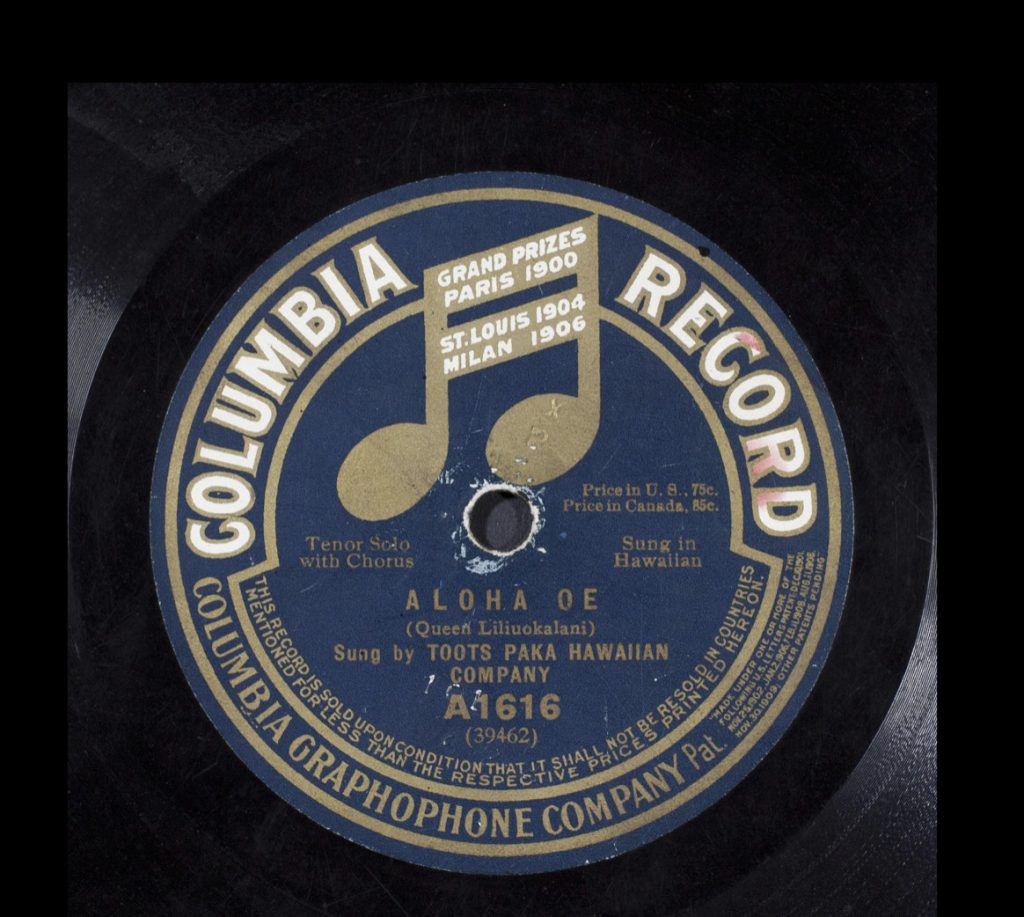While looking through the Library of Congress’ National Jukebox collection, one song that caught my eye was “Aloha Oe.” Specifically, it caught my eye because the composer listed was Lili’uokalani, who I know as the last sovereign monarch of Hawaii, and who was removed from power by a coup orchestrated by the US government. Queen Lili’uokalani is a fascinating historical figure; she worked tirelessly for the sovereignty of the Hawaiian people even during her imprisonment after the overthrow. She was also a prolific composer and poet, mainly writing in the style of mele ho’oipoipo, which are love songs that incorporate nature metaphors. Looking through translations of songs she wrote, I think that some undoubtedly would fit into any collection of protest songs.
“Aloha Oe” is one of Lili’uokalani’s most well known songs… Some people may recognize this tune from “Lilo and Stitch” or Johnny Cash’s recording. The version below (sorry, you have to click to view on YouTube) was recorded by four famous Hawaiian musicians and was used in a TV special about the Hawaiian sovereignty movement. The lyrics of this song convey a lover’s goodbye, but it has been interpreted to represent the farewell of a queen to her country; a lament for the loss of Hawaiian sovereignty.
Haʻaheo ka ua i nā pali
Proudly swept the rain by the cliffs
Ke nihi aʻela i ka nahele
As it glided through the trees
E hahai (uhai) ana paha i ka liko
Still following ever the bud
Pua ʻāhihi lehua o uka
The ʻahihi lehua* of the vale
Aloha ʻoe, aloha ʻoe
Farewell to you, farewell to you
E ke onaona noho i ka lipo
The charming one who dwells in the shaded bowers
One fond embrace,
A hoʻi aʻe au
'Ere I depart
Until we meet again
ʻO ka haliʻa aloha i hiki mai
Sweet memories come back to me
Ke hone aʻe nei i kuʻu manawa
Bringing fresh remembrances of the past
ʻO ʻoe nō kaʻu ipo aloha
Dearest one, yes, you are mine own
A loko e hana nei
From you, true love shall never depart
Maopopo kuʻu ʻike i ka nani
I have seen and watched your loveliness
Nā pua rose o Maunawili
The sweet rose of Maunawili
I laila hiaʻai nā manu
And 'tis there the birds of love dwell
Mikiʻala i ka nani o ka lipo
And sip the honey from your lips
*A flowering plant, I highly recommend reading more about the cultural context in this handout from the Hawai‘i Forest Institute & Hawai‘i Forest Industry Association.
The recording I found in the National Jukebox is performed by the Toots Paka Hawaiian Company. The Toots Paka Hawaiian Company was a popular group of the “hula craze” around the 1920’s. Toots Paka was a vaudeville hula dancer, who claimed Hawaiian heritage. Listen to the recording here:
While it is impossible to definitively confirm Toots’s training in hula/ Hawaiian heritage, census records show that she was born Hannah Jones in Port Huron, Michigan, and that she began dancing under the stage name Tootsie Jones. She seemingly got into performing hula when she married one of the performers of the Hawaiian Glee Club, “a group of Kānaka Maoli musicians who were touring the mainland as a novelty band performing both innovative and traditional Hawaiian music and steel guitar shows” (Gentry). The act evolved into “Toots Paka Hawaiian Company,” with their advertising centering around Toots and her physical beauty. In interviews, Toots perpetuates colonial ideas of the unending youthfulness of Hawaiian women and an Edenic image of Hawaii, and she undoubtedly used a caricature of Hawaiian culture to her advantage in building an entertainment career. However, Gentry writes that one of things that makes Toots Paka interesting among vaudeville hula performers is her true proximity to Kānaka Maoli musicians; they performed in the Hawaiian language, and as I mentioned before, Aloha ‘Oe is certainly a meaningful song. In contrast, some performers at this time used a “Hawaiian Ragtime” style and blatantly nonsense lyrics.
The National Jukebox recording has some similarities to the version performed by Israel Kamakawiwoʻole and company. They are slow in tempo, use stringed instruments, and harmonies that sound somewhat similar. However, the message and purpose of the songs in context are very different: one recording continues a long tradition of commodification, while the other offers a more reflective view on the injustice that Native Hawaiians have endured.
Bibliography
“Aloha Oe.” Accessed November 14, 2024. https://www.huapala.org/Aloha/Aloha_Oe.html.
Gentry, Briand. ““More Hawaiian than Hawaii itself”: The Hula Craze and US Empire in the Progressive Era.” Feminist Media Histories 9, no. 4 (Fall, 2023): 81-107. Doi: https://doi.org/10.1525/fmh.2023.9.4.81. https://www.proquest.com/scholarly-journals/more-hawaiian-than-hawaii-itself/docview/3112827257/se-2.
Liliʻuokalani Trust. “Her Story.” Accessed November 13, 2024. https://onipaa.org/her-story.
Toots Paka Hawaiian Company. Aloha Oe. New York, New York, 1914. https://www.loc.gov/item/jukebox-650171/.

